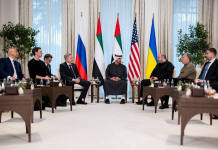U.S. Secretary of State Antony Blinken said Monday that four key Arab nations and Turkey have agreed to begin planning for the reconstruction and governance of Gaza once Israel’s war against Hamas ends.
Blinken, who is on an urgent Mideast mission aimed primarily at preventing the conflict from spreading as fears rise of a regional war, said Saudi Arabia, Jordan, Qatar, the United Arab Emirates and Turkey would consider participating in and contributing to “day after” scenarios for the Palestinian territory, which has been devastated by three months of deadly Israeli bombardment.
Those countries had previously resisted U.S. calls for post-war planning to begin, insisting that there must first be a cease-fire and a sharp reduction in the civilian suffering caused by Israel’s military response to Hamas’ deadly Oct. 7 attacks.
But on what is now his fourth trip to the Mideast since the war began in October, Blinken said those countries are ready to start such planning and that each would consider its own involvement in whatever is eventually decided upon.
“Everywhere I went, I found leaders who are determined to prevent the conflict that we’re facing now from spreading, doing everything possible to deter escalation to prevent a widening of the conflict,” Blinken told reporters traveling with him.
Blinken made the comments after meeting Saudi Crown Prince Mohammed bin Salman at the Saudi royal’s winter camp outside the ancient incense-route trading city of Al Ula in western Saudi Arabia. Blinken had earlier visited Turkey, Greece, Jordan, Qatar and the UAE.
The leaders of those countries “agreed to work together and to coordinate our efforts to help Gaza stabilize and recover, to chart a political path forward for the Palestinians and to work toward long-term peace, security and stability in the region as a whole,” Blinken said.
He said they “are prepared to make the necessary commitments to make the hard decisions to advance all of these objectives to advance this vision for the region.”
Blinken did not offer specifics on potential contributions. Financial and in-kind support from the UAE and Saudi Arabia could be essential to the success of any plan.
Arab states have been highly critical of Israel’s actions and had eschewed public support for long-term planning, arguing that the fighting must end before such discussions can begin. They have been demanding a cease-fire since mid-October as civilian casualties began to skyrocket.
Blinken said he would bring the Arab commitments to Israeli Prime Minister Benjamin Netanyahu and his war Cabinet as well as Palestinian leader Mahmoud Abbas on Tuesday and Wednesday before presenting them to Egyptian President Abdel Fatah Al-Sisi and returning to Washington.
Any post-war plan for Gaza will require both Israeli and Palestinian buy-in, but Netanyahu and his government have their own ideas for Gaza’s future that the others will likely not accept. And, Netanyahu remains opposed to the concept of the two-state resolution to the Israeli-Palestinian conflict, something that Saudi Arabia in particular is demanding if it is to normalize relations with Israel.
Blinken said Prince Mohammed remains interested in normalizing relations with Israel “but it will require that the conflict end in Gaza, and it will also clearly require that there be a practical pathway to a Palestinian state.”
By Nadeem Faisal Baiga








